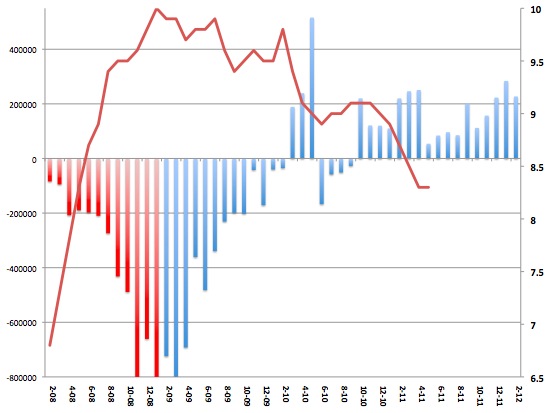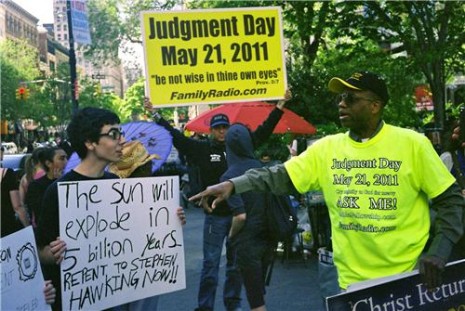His latest:
“I don’t believe in an America where the separation of church and state is absolute,” Santorum said Sunday on ABC’s “This Week.”
He was referring to a 1960 speech by then-presidential candidate John F. Kennedy on religion and governance, which Santorum said “makes me throw up.”
“Because the first line, first substantive line in the speech says, ‘I believe in America where the separation of church and state is absolute,” the former Pennsylvania senator said. “You bet that makes you throw up.”
Santorum said Kennedy “was trying to tell people of faith that you will do what the government says, we are going to impose our values on you.”
In America, you can pray at church. You can pray at home. You can pray in the street. You can pray in parks. You can pray in train stations and bus terminals and airports. You can pray in any public place, in fact, including “the public square.” Yes, you can even pray in school. Students can pray in buses on the way to school, they can pray around the flagpole, they can pray on the fields. They can pray in the halls, and they can pray in religious clubs, and they can even pray singly or in groups in classrooms before and after classes, so long as they do not disrupt school proceedings. They can even pray to themselves during class all they like. And they can pray after school in any variety of ways, including on school grounds. The only exception is that the prayer cannot be led or endorsed by anyone representing the school.
Prayer already permeates into government affairs beyond what church and state should allow. Prayers are said before many government proceedings. Invocations are regularly held at ceremonies and events paid for by tax dollars. Most of our national holidays are religious or have religious themes. “So help me God” is now so expected at the end of an oath that omitting it is cause for widespread public excoriation on the official–in direct violation of the Constitution. God has been injected into an oath which millions of schoolchildren are forced to recite daily. God has been imposed on virtually every piece of currency the country produces. Lawmakers constantly try to impose religious beliefs into law, forcing the entire public to live by their own religious doctrine. And to even become a lawmaker, it is virtually a prerequisite that one is not only religious, but that one makes a public show of that religion. Exceptions are exceedingly rare. It should be that no government representative may endorse a religious act, but it happens far too often.
So, how, exactly, is Santorum sickened by all of this persecution of religion, pray tell?
You know what makes me sick? It is people who are so completely, mind-numbingly ignorant of our history that they do not know how the separation of church and state was designed to protect religious freedom in this country, and that it has done so mostly successfully for the past few centuries–but that freedom of belief is now being threatened by a large number of people, and Santorum is one of many leading that charge.
It’s History 101. Puritans, Quakers, Mennonites, Jews, and Catholics are among the many religious groups that fled to America from the 17th century onward–many of them facing persecution in the United States, some of them becoming the persecutors themselves. One constant was clear, however: wherever the matters of church and state coincided, the potential for religious persecution flourished.
The very Pilgrims who came across on the Mayflower, the ones celebrated by Christians in America to this day (with a public national holiday, no less), came seeking relief and respite from religious laws in England, such as the Act of Uniformity which required everyone in the country to attend government-mandated prayers–this the result of the marriage of church and state. The exact same type of marriage that Santorum and others protest is their God-given right.
Objections in recent years that abolishing the separation of church and state in America would lead to religious persecution of minority beliefs have been scoffed at by many in America, dismissed as paranoid by social conservatives–even as they seek to impose their religious will on all Americans. They want to outlaw abortion, weakly denying the fact that it is a decision based on religious beliefs; they want to outlaw contraception, another religious doctrine enforced; and they want to institute Christian prayer in public schools, which every child is required to attend, save difficult and expensive alternatives. They make laughably absurd exceptions, like children may opt out or sit silent–as if they will not still be exposed to religious indoctrination anyway, or that they will not be singled out and subjugated to bullying by the Christian kids in the majority. In the many places in the U.S. where prayer is illegally practiced in public schools, this kind of thing happens all too often.
Let’s look at a case in point: the Indian River School District in Delaware. In a country where Christians wail about religion never being allowed anywhere near a school ever, this particular school district was rife with religion. Christian prayer was practiced in classrooms. Teachers and staff led Bible clubs, with club members given special privileges, like going to the head of the lunch line. Non-Christian students were pressured to join the Bible clubs by school officials. Teachers handed out Christian literature, and spoke of “one true religion” in classes. And so on.
At the 2003 graduation ceremony, things came to a head. Samantha Dobrich, a Jewish high school student, was among the graduates. Reverend Jerry Fike, pastor of the Mount Olivet Brethren Church, having been invited by the school, recited an invocation at the ceremony. In this invocation, the pastor singled out Ms. Dobrich, as “one specific student” who should be “guided” “in Jesus’ name.”
Now, let’s stop here for a moment. Imagine there was a Christian student in a neighborhood in Michigan which was mostly Muslim, and that the student happened to be the only Christian in a public school dominated by Muslims. Say that the local Imams had forced Islam onto the school and the school board, and that they were trying to institute Islamic prayer into the school’s daily practices. Then imagine if, during the graduation ceremony, an Imam singled out the Christian student and prayed that they be guided into the arms of the Prophet Muhammed, in the name of Allah.
You don’t think that American Christians, upon hearing this story, would go absolutely apeshit?
And yet this is what happened in the Delaware school, with Christians in the starring role. However, that is not the end of the story; while this infringement on religious freedom is bad enough, it goes naturally hand-in-hand with the societal pressures, sometimes violent, against those who do not conform with the majority.
The Dobrich family, already unhappy with how their children (including a younger one still in the sixth grade) were facing Christian pressures at a school their children were legally required to attend, were understandably upset by what had happened at the graduation. The girl’s mother complained to the school board, which was predominantly Christian and had been responsible for the act in the first place. The board unofficially offered a “compromise” to not have prayer at graduation ceremonies in the near future, but they did not agree to barring prayer in daily school activities, and soon after the offer was made, a number of local residents protested. At a board meeting to decide a “religion policy,” the Dobriches felt so threatened that they required a state trooper to escort them:
…the raucous crowd applauded the board’s opening prayer and then, when sixth-grader Alexander Dobrich stood up to read a statement, yelled at him: “take your yarmulke off!” His statement, read by Samantha, confided “I feel bad when kids in my class call me Jew boy.”
A state representative spoke in support of prayer and warned board members that “the people” would replace them if they faltered on the issue. Other representatives spoke against separating “god and state.”
A former board member suggested that Mona Dobrich might “disappear” like Madalyn Murray O’Hair, the atheist whose Supreme Court case resulted in ending organized school prayer. O’Hair disappeared in 1995 and her dismembered body was found six years later.
After the meeting, the Dobrich family was subjected to an unbearable level of invective, in the school, in their neighborhood, and in the community. Their son wes bullied at school, his classmates calling him “Christ-killer” and making him fearful of wearing a yarmulke. The family was harassed by phone threats, claiming that the KKK was nearby, and callers to a local radio station said they should convert or leave the area. The family eventually did leave, resettling in a community two hours away.
This is a sad, even frightening, and yet apt example of what happens when church and state are allowed to commingle, even on such a limited scale. In this case, the victim was a Jewish family. In recent years, Muslims have found plans to open mosques forbidden by local Christians, and have been subjected to overt hostility in public affairs. And let’s not even begin to discuss the hatred levied at atheists.
But the separation of church and state is not just intended for non-Christians. Remember, Christians fleeing religious persecution throughout American history were not fleeing oppression at the hands of Muslims, or by atheists or a secular state; they fled persecution by fellow Christians.
Look at Romney. While tolerated, his Mormon beliefs are disdained by many in the party, some openly. There are many religious groups, which, if in power, would gladly place restrictions and prohibitions on Mormons, as well as a number of other religious orders. Catholics, now complaining that their religion is being oppressed because of secular policy, would likely by high on the list of targets were that secularism to be removed.
A secular state is not anti-religious. Quite the opposite. It is, however, hostile to those who would impose religious persecution.
As a result, there remain two, and only two, possibilities. One is that Santorum, and others like him, are so stupid that they cannot comprehend the absolute necessity of separation of church and state as a bulwark against persecution and a guarantee of religious liberty.
Or, two, they understand full well, and they knowingly attack separation because they want to impose their specific religious creed on all others, willingly suppressing the religious beliefs of others.
If the latter, then Santorum–a Catholic–who presumably believes that Christians will all band together to convert the non-Christians, may someday find he is amongst those who face persecution by the majority religious order wedded to the state.


